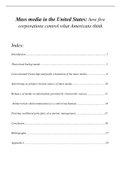Mass media in the United States: how five
corporations control what Americans think
Index:
Introduction ............................................................................................................. 3
Theoretical backgrounds .......................................................................................... 5
Concentrated Ownership and profit orientation of the mass media .......................... 6
Advertising as primary income source of mass media ............................................ 10
Reliance of media on information provided by trustworthy sources ....................... 11
Antiterrorism (Anticommunism) as a control mechanism ...................................... 14
Praising neoliberal principles of economic management.........................................15
Conclusion ............................................................................................................. 16
Bibliography …………………………………………………………………………………17
Appendix I…………………………………………………………………………………….18
,Introduction
William Blum, historian, and renowned critic of U.S. foreign policy, starts his article
“American Exceptionalism and US Foreign Policy” with the following question: “Each of you I’m
sure has met many people who support American foreign policy, with whom you’ve argued and
argued. You point out one horror after another, from Vietnam to Iraq. From god-awful bombings and
invasions to violations of international law and torture. And nothing helps. Nothing moves this
person. Now Why is that?” (2014: 1).
He explains this phenomenon in the following way, he states that people around the world
have certain preconceptions, so consciously or unconsciously people have some basic beliefs about
the United States and its foreign policy. He adds that the most basic of these basic beliefs “is a deeply-
held conviction that no matter what the United States does abroad, no matter how bad it may look,
no matter what horror may result, the government of the United States means well” (2014: 2).
Let us take a look at how exceptional US foreign policy has been. Since the end of World
War II, the United States has been conducted wars and military actions in: the Korean War, the
Vietnam War, Grenada, Panama, Bosnia, Somalia, Iraq, Afghanistan and Pakistan, Syria and so on.
The United States has attempted to overthrow more than 50 foreign governments (most of which were
democratically-elected), it has dropped bombs on the people of more than 30 countries, it has
attempted to suppress a populist or nationalist movement in 20 countries, it has interfered in
democratic elections in at least 30 countries, etc. No other country in all of history comes anywhere
close to such a record. However, it seems like people are not aware of it; all people around the world
tend to believe that all these intentions are always honorable, even noble. As Blum ironically points
out “no matter how bad it may look, no matter what horror may result, the government of the United
States means well. American leaders may make mistakes, they may blunder, they may lie, they may
even on the odd occasion cause more harm than good, but they do mean well”. This brings up to the
question of whether all this people are sensible (blind) or not? Don’t they realize that they are being
manipulated? (2014: 2)
2
, This is a good example of the capacity of the Mass media to influence people’s minds and
forming people’s opinion. The fact that almost everyone gets information about world, national, and
local news from the mass media gives them the important functions of providing a link between the
government and the people, influencing public opinion, determining the political agenda.
The mass media present us all interventions of the EU as democracy-promoted missions. It
seems like they always acted from the highest of motives, without any own interest, just because of
the peace and justice. A famous American journalist Frances Fitzgerald (1980), in her study of
American school textbooks, summarized the message of these books about American foreign policy
in the following way: “The United States has been a kind of Salvation Army to the rest of the world:
throughout history it had done little but dispense benefits to poor, ignorant, and diseased countries.
The U.S. always acted in a disinterested fashion, always from the highest of motives; it gave, never
took.”
One might wonder how so many different news sources could all completely avoid
mentioning that the US government has been consciously supporting some radical parties and
guerillas …One might also wonder why almost all the US mass media news praise American
interventions: the explanation is surprisingly simple, there aren’t numerous mass media news sources
at all; there are just five. What we have is that five giant corporations control 90 percent of US mass
media and spread their information along the world. They have direct links to the political
establishment and the economic and political power-elites of the United States.
The purpose of this paper is to analyze the United States’ media in terms of their basic
institutional structures and relationships within which they operate with the government and other
institutions. In present work I will intend to explain why the behavior of news media is highly
influenced by corporate and political power.
3




